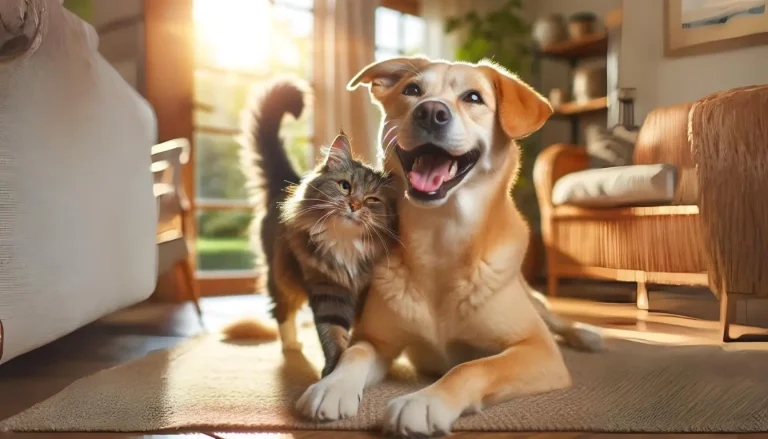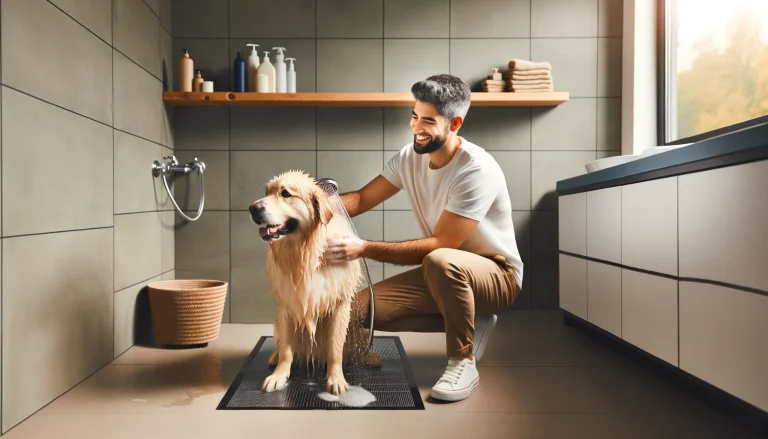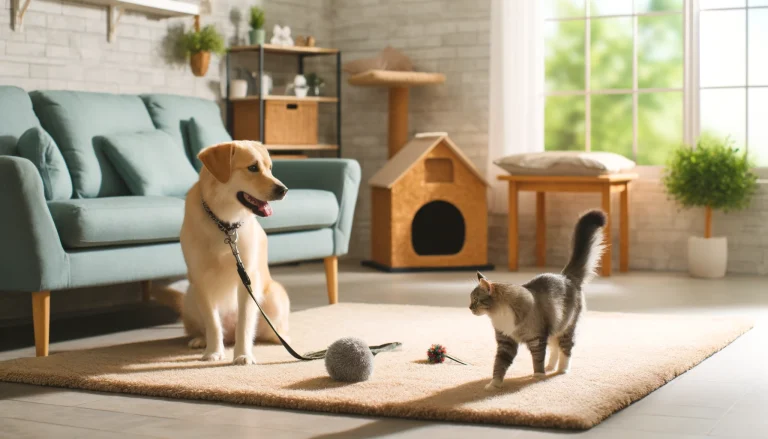Having a pet is one of life’s greatest joys, but just like humans, our furry companions can experience stress and anxiety. These feelings can stem from various factors, including changes in their environment, health issues, or even boredom. Addressing these issues is crucial to maintaining their overall well-being and happiness. In this guide, we’ll explore practical and effective methods to relieve pet stress and anxiety, ensuring your pet leads a calmer and more contented life.
Pets, whether they’re dogs, cats, or other animals, exhibit their stress and anxiety in unique ways. By understanding these signs and implementing the right strategies, you can significantly improve your pet’s quality of life. From creating a serene environment to using natural supplements, this article provides a comprehensive approach to relieve pet stress and anxiety. Let’s dive in and explore how you can make your pet’s life more relaxed and joyful.

Understanding Pet Stress
Pets, much like their human counterparts, can experience a wide range of emotions, including stress and anxiety. However, unlike humans, pets cannot verbally communicate their feelings. To relieve pet stress and anxiety, it requires observing their behavior and interpreting the subtle signs they exhibit. Stress in pets can arise from numerous sources, including changes in their environment, loud noises, separation from their owners, and even underlying health issues. Recognizing and understanding these triggers is the first step towards alleviating their stress and improving their overall well-being.
Behavioral Signs of Stress
One of the most common signs of stress in pets is a change in behavior. For instance, a normally playful dog might become withdrawn and lethargic, while a usually calm cat might start exhibiting aggressive behavior. Other signs include excessive barking or meowing, destructive behavior like chewing furniture or scratching walls, and changes in eating and sleeping patterns. Some pets might also develop repetitive behaviors such as licking or grooming themselves excessively, which can lead to physical injuries.
Physical Manifestations of Stress
It’s essential to understand that pet stress is not just a behavioral issue but can also have physical manifestations. For example, a stressed pet might experience gastrointestinal problems like vomiting or diarrhea. They might also show signs of excessive panting, drooling, or trembling. In severe cases, prolonged stress can weaken a pet’s immune system, making them more susceptible to illnesses and infections.
Identifying and Addressing Triggers
Understanding your pet’s stress is crucial because it allows you to take proactive steps to alleviate it. By identifying the specific triggers and observing the signs of stress, you can tailor your approach to meet your pet’s needs. For example, if your pet is stressed by loud noises, creating a quiet, safe space for them can help. If separation anxiety is the issue, gradually acclimating them to being alone with positive reinforcement can make a significant difference.
Patience and Consistency
It’s also important to remember that each pet is unique, and what works for one might not work for another. Patience and consistency are key when addressing pet stress. Sometimes, a combination of strategies is necessary to achieve the best results. For example, providing mental stimulation through toys and interactive games, coupled with regular exercise and a balanced diet, can help reduce stress levels in pets.
Common Causes of Anxiety
Understanding the common causes of anxiety in pets is essential to effectively relieve pet stress and anxiety. Anxiety in pets can be triggered by various factors, each impacting their mental and physical health in different ways. Here, we explore some of the most prevalent causes of pet anxiety and provide insights into how each one affects your furry friend.
Environmental Changes
One of the most common causes of anxiety in pets is a change in their environment. Pets are creatures of habit, and they thrive on routine and familiarity. When there is a significant change in their surroundings, such as moving to a new home, redecorating, or introducing new furniture, pets can become disoriented and anxious. This change disrupts their sense of security and comfort, leading to stress.
For instance, moving to a new house can be overwhelming for pets because they lose their familiar scents and landmarks. They may struggle to find their favorite spots and feel unsure about their new territory. Similarly, major changes within the home, like new flooring or rearranging furniture, can unsettle them, as their once predictable environment becomes unfamiliar.
Loud Noises
Loud noises are another significant trigger for pet anxiety. Thunderstorms, fireworks, construction work, and even household appliances like vacuum cleaners can cause extreme stress in pets. Dogs and cats, in particular, have sensitive hearing, and sudden, loud sounds can startle them, triggering a fight-or-flight response.
During thunderstorms, pets might seek refuge in hiding places, tremble, or display destructive behavior in an attempt to escape the noise. Fireworks, with their unpredictable explosions, can be especially terrifying, causing pets to panic and potentially injure themselves in their attempt to flee from the noise.
Separation from Their Owner
Separation anxiety is a common issue, especially in dogs, but it can affect other pets as well. Pets with separation anxiety become extremely stressed when left alone, even for short periods. This condition often manifests as excessive barking, howling, destructive behavior, and house soiling when the owner is not present.
Pets with separation anxiety form strong bonds with their owners and rely heavily on their presence for comfort and security. When left alone, they feel abandoned and become anxious. This anxiety can start even before the owner leaves, as pets pick up on cues like putting on shoes or grabbing keys.
Presence of Other Animals
The introduction of new pets into the household can be a significant stressor. Existing pets may feel threatened by the presence of a new animal, leading to anxiety and territorial behavior. This situation can be particularly challenging if the new pet is of a different species or has a dominant personality.
Pets are territorial by nature, and the arrival of a new animal disrupts the established hierarchy and balance in the home. They may display aggression, become withdrawn, or show signs of stress like excessive grooming or urination in inappropriate places.
Social Factors
Social factors, such as interactions with other pets or people, can also contribute to pet anxiety. Pets that are not well-socialized or have had negative experiences with other animals or humans may develop anxiety. This can manifest as fear of strangers, aggression towards other pets, or avoidance behavior in social settings.
Poor socialization during the critical early stages of a pet’s life can lead to long-term anxiety issues. Pets that have been isolated or have had traumatic encounters may struggle to trust new people or animals, resulting in anxiety when faced with unfamiliar social situations.
Health Issues
Underlying health problems can also cause anxiety in pets. Pain, discomfort, or medical conditions such as thyroid imbalances, neurological disorders, or gastrointestinal issues can contribute to stress. Pets might not understand why they feel unwell, leading to anxiety and changes in behavior.
It’s crucial to consult a veterinarian if you suspect that your pet’s anxiety may be linked to a health issue. Proper diagnosis and treatment of medical conditions can help relieve pet stress and anxiety, improving your pet’s overall quality of life.
Creating a Calm Environment
Creating a serene and stress-free environment for your pet is essential to relieve pet stress and anxiety, promoting their mental and physical well-being. Pets thrive in environments where they feel safe, secure, and comfortable. By making a few adjustments to your home and daily routine, you can significantly reduce your pet’s anxiety and promote a more relaxed atmosphere. Here are some effective strategies to create a calm environment and relaxation spaces for your beloved pets.
Designing a Safe Space
Every pet needs a designated area where they can retreat and feel completely safe. This space should be quiet, comfortable, and free from potential stressors. For dogs, this might be a crate lined with soft bedding, placed in a quiet corner of the house. For cats, consider a cozy cat tree or a designated room with their favorite toys and a comfy bed.
It’s crucial to ensure that this safe space is always accessible, especially during times of stress, such as during thunderstorms or when there are visitors in the house. Allow your pet to use this area voluntarily and avoid forcing them into it, as this could create negative associations.
Using Calming Music and Sounds
Music can have a profound impact on reducing anxiety in pets. Studies have shown that classical music, in particular, can help calm dogs and cats. Create a playlist of soothing music and play it at a low volume when your pet seems anxious. There are also specially designed pet music tracks and sound machines available that mimic calming sounds like purring or heartbeat rhythms.
In addition to music, consider using white noise machines to mask loud, startling sounds from outside, such as traffic or construction noise. This can help create a more peaceful environment and prevent sudden noises from triggering anxiety.
Aromatherapy and Calming Scents
Aromatherapy can be beneficial for pets, just as it is for humans. Certain scents, such as lavender and chamomile, have calming effects on animals. You can use pet-safe essential oil diffusers to disperse these calming scents throughout your home. Be sure to choose high-quality, pet-safe essential oils and follow the recommended guidelines for their use.
Another option is to use pheromone diffusers. These devices release synthetic versions of the calming pheromones that pets naturally produce. Products like Feliway for cats and Adaptil for dogs can help create a sense of security and reduce stress-related behaviors.
Maintaining a Consistent Routine
Pets feel more secure and less anxious when they have a predictable routine. Try to maintain a consistent schedule for feeding, walks, playtime, and bedtime. Predictability helps pets know what to expect and reduces the uncertainty that can lead to anxiety.
If you need to make changes to your pet’s routine, try to introduce them gradually. Sudden changes can be overwhelming and stressful. For example, if you need to alter your pet’s feeding time, adjust it by a few minutes each day until you reach the new schedule.
Providing Mental Stimulation
Boredom can lead to anxiety and destructive behaviors in pets. Providing plenty of mental stimulation can keep your pet engaged and reduce stress. Interactive toys, puzzle feeders, and treat-dispensing toys are excellent ways to challenge your pet’s mind and keep them entertained.
Regular playtime is also essential for your pet’s mental health. Engage in activities that your pet enjoys, whether it’s a game of fetch for dogs or interactive wand toys for cats. This not only provides physical exercise but also strengthens the bond between you and your pet.
Creating a Comfortable Sleeping Area
A comfortable sleeping area is vital for your pet’s relaxation. Ensure that your pet’s bed is soft, supportive, and appropriately sized. Place the bed in a quiet part of the house where your pet can sleep without being disturbed by household activities.
For older pets or those with joint issues, consider orthopedic beds that provide extra support and comfort. Heated beds can also be beneficial for pets that suffer from arthritis, as the warmth helps to soothe sore joints.
Reducing Exposure to Stressors
Identify and minimize exposure to potential stressors in your home. If your pet is anxious around strangers, limit their interaction with visitors and provide them with a safe space to retreat to. During loud events like parties or fireworks, keep your pet indoors and create a cozy environment where they can feel secure.
It’s also important to monitor your own behavior, as pets can pick up on their owner’s stress and anxiety. Try to remain calm and composed around your pet, especially during stressful situations.

Using Supplements
When it comes to relieving pet stress and anxiety, natural supplements can play a significant role. These supplements are designed to support your pet’s nervous system and promote a sense of calm without the side effects often associated with prescription medications. However, it’s crucial to use these supplements correctly and under the guidance of a veterinarian to ensure they are safe and effective for your pet. Here’s a detailed guide on how to use supplements to help reduce your pet’s anxiety.
Understanding Pet Anxiety Supplements
There are various types of supplements available that can help manage anxiety in pets. These supplements typically contain natural ingredients known for their calming properties. Some of the most common and effective ingredients include:
- Chamomile: Known for its soothing properties, chamomile can help relax muscles and reduce stress in pets.
- Valerian Root: Often used to manage anxiety and insomnia in humans, valerian root can also help pets by promoting relaxation and improving sleep quality.
- L-Theanine: An amino acid found in green tea, L-theanine helps increase the levels of calming brain chemicals such as serotonin and dopamine.
- CBD Oil: Derived from the hemp plant, CBD oil can help reduce anxiety and promote a sense of calm without the psychoactive effects of THC.
- Melatonin: A hormone that regulates sleep, melatonin can help pets who have trouble sleeping due to anxiety.
Choosing the Right Supplement
Before choosing a supplement for your pet, it’s important to consult with your veterinarian. They can recommend the best type of supplement based on your pet’s specific needs and health conditions. Here are a few factors to consider:
- Type of Anxiety: Identify whether your pet’s anxiety is situational (e.g., due to thunderstorms or car rides) or more generalized. This will help determine the best supplement and dosage.
- Pet’s Size and Weight: Dosages can vary based on your pet’s size and weight, so it’s essential to get the correct dosage to avoid any potential side effects.
- Existing Health Conditions: If your pet has any existing health issues, certain supplements may not be suitable. Your vet can help you choose a safe option.
Administering Supplements
Once you’ve selected the appropriate supplement, it’s important to administer it correctly. Here are some tips on how to give your pet their supplement:
- Follow Dosage Instructions: Always adhere to the recommended dosage instructions provided by your veterinarian or the supplement manufacturer. Overdosing can lead to adverse effects, while underdosing may not provide the desired benefits.
- Mix with Food: Many supplements come in forms that can be easily mixed with your pet’s food, such as powders, chews, or oils. Mixing supplements with food can make it easier for your pet to consume them without fuss.
- Use Treats: If your pet is reluctant to take the supplement, you can hide it in a treat. There are also supplement-infused treats available that combine the benefits of the supplement with the appeal of a tasty snack.
- Timing: Administer the supplement at the right time. For situational anxiety, give the supplement 30 minutes to an hour before the anticipated stressor (e.g., before a car ride or during a storm). For general anxiety, follow a consistent daily schedule as recommended by your vet.
Monitoring and Adjusting
After starting your pet on a supplement regimen, closely monitor their behavior and health. Look for signs of reduced anxiety, such as increased calmness, reduced destructive behavior, and improved sleep. Keep track of any changes and discuss them with your veterinarian during follow-up visits.
If you notice any adverse reactions or if the supplement doesn’t seem to be effective, consult your vet. They might adjust the dosage or suggest trying a different supplement. Every pet is unique, so it may take some trial and error to find the most effective solution.
Natural Supplements vs. Prescription Medications
While natural supplements can be very effective, they might not be suitable for all pets, especially those with severe anxiety. In some cases, prescription medications may be necessary. These medications should only be used under the strict guidance of a veterinarian and typically as a last resort after exploring natural options.
Conclusion
Using natural supplements can be a highly effective way to manage and reduce anxiety in pets. By selecting the right supplement, administering it correctly, and closely monitoring your pet’s response, you can help your furry friend lead a calmer, happier life. Always consult with your veterinarian before starting any new supplement regimen to ensure it’s safe and appropriate for your pet’s specific needs. With the right approach, supplements can be a valuable tool in creating a stress-free environment for your beloved companion.
Beyond supplements, remember that a holistic approach to relieve pet stress and anxiety, combining a safe environment, consistent routine, and plenty of love and attention, is key to managing pet anxiety. Each pet is unique, and finding the right balance of these strategies will require patience and observation. By taking these steps, you not only enhance your pet’s quality of life but also strengthen the bond you share, making every moment together more joyful and stress-free.
FAQs
How can I tell if my pet is stressed?
Look for signs such as excessive barking, destructive behavior, changes in appetite, hiding, excessive grooming, or aggression. Physical symptoms might include trembling or drooling.
What are common causes of pet anxiety?
Common causes include loud noises, unfamiliar surroundings, separation from their owner, or the presence of other animals.
What are some effective ways to reduce pet anxiety?
Regular exercise, mental stimulation through toys and games, and spending more time with your pet can help. Creating a calm environment and using natural supplements can also be beneficial.
Are there natural supplements that can help reduce pet anxiety?
Yes, supplements containing ingredients like chamomile, valerian root, and CBD oil can help. Always consult with your veterinarian before starting any new supplement.
When should I seek professional help for my pet’s anxiety?
If your pet’s anxiety persists despite your best efforts, consult a veterinarian to rule out medical conditions and consider working with a pet behaviorist.
Can changes in the environment cause pet stress?
Yes, changes such as moving to a new home, the arrival of a new pet or family member, or even changes in routine can cause stress in pets.
Discover More Tips on Pet Care
Caring for your pet’s mental and physical well-being is a continuous journey filled with learning and love. If you found this guide on how to relieve pet stress and anxiety helpful, we invite you to explore more valuable tips and insights on our blog. From nutrition advice to grooming tips, and understanding pet behavior, our comprehensive pet care guides are designed to help you ensure a happy and healthy life for your furry friends.
Visit our blog at Pet Care Guide to discover more articles on how to provide the best care for your beloved pets. Stay informed, stay compassionate, and let’s make every moment with our pets as joyful and stress-free as possible.
Thank you for being a dedicated pet parent and for choosing to keep your pets’ lives happy and healthy!



